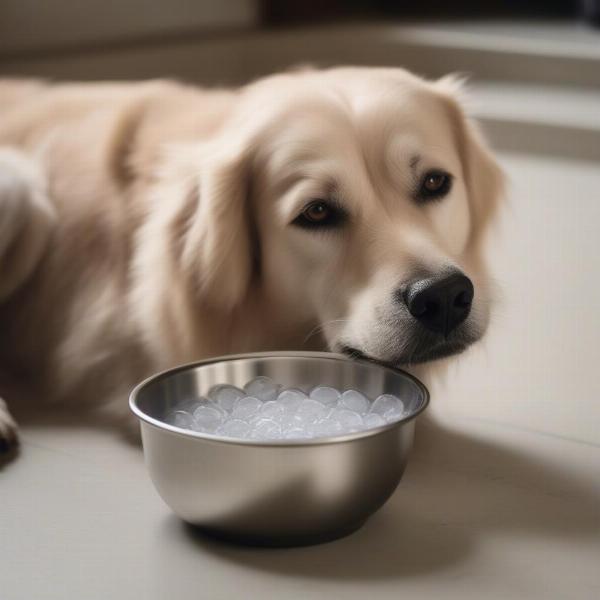Dog seltzer has recently emerged as a trendy treat for our canine companions. But is this bubbly beverage truly beneficial for dogs, or is it simply a marketing gimmick? This article dives deep into the world of dog seltzer, exploring its ingredients, potential benefits, risks, and offering guidance on whether or not it’s a suitable addition to your dog’s diet.
What Exactly is Dog Seltzer?
Dog seltzers are specifically formulated beverages designed for canine consumption. Unlike alcoholic seltzers for humans, these drinks are non-alcoholic and often infused with flavors appealing to dogs, like chicken, beef, or salmon. They’re typically marketed as a healthy hydration option, offering a more exciting alternative to plain water. Some brands even boast added vitamins and minerals. But before you crack open a can for your furry friend, it’s crucial to understand the potential implications for their health.
Is Dog Seltzer Safe for My Dog?
The safety of dog seltzer depends largely on its ingredients. Always scrutinize the label for artificial sweeteners, added sugars, or other potentially harmful additives. Xylitol, a common artificial sweetener, is extremely toxic to dogs and should be avoided at all costs. Look for seltzers made with natural flavors and minimal ingredients. If you’re unsure about a specific ingredient, consult your veterinarian.
Potential Benefits of Dog Seltzer
Proponents of dog seltzer argue that it can encourage increased water intake, especially for picky drinkers. The added flavor may entice dogs who are otherwise reluctant to hydrate adequately. Some seltzers also contain electrolytes, which can be beneficial for active dogs or those recovering from illness. However, these benefits can be achieved through other, less processed means, such as adding low-sodium chicken broth to water.
 Dog Drinking Seltzer
Dog Drinking Seltzer
Potential Risks of Dog Seltzer
While dog seltzer might seem harmless, there are potential risks to consider. Some dogs may experience gastrointestinal upset, such as gas or bloating, due to the carbonation. Additionally, the added flavors, even natural ones, could trigger allergies in sensitive dogs. Furthermore, relying solely on seltzer for hydration could lead to nutrient deficiencies if it replaces a balanced diet. Dr. Emily Carter, DVM, a veterinary nutritionist at the Animal Wellness Center, advises, “While dog seltzer might be a fun occasional treat, it shouldn’t replace fresh water as the primary source of hydration.”
Making Informed Choices: Tips for Choosing a Dog Seltzer
If you decide to give dog seltzer a try, do your research. Choose brands with transparent ingredient lists and avoid those containing artificial sweeteners, added sugars, or excessive sodium. Introduce the seltzer gradually and monitor your dog for any adverse reactions. Remember, fresh water should always be readily available. Dr. Andrew Miller, PhD in Animal Behavior at the Canine Cognition Institute, suggests, “Observe your dog’s reaction closely after introducing any new treat, including seltzer. If you notice any digestive upset or changes in behavior, discontinue use and consult your veterinarian.”
Conclusion
Dog seltzer can be a refreshing treat in moderation, but it’s essential to prioritize your dog’s health and well-being. Always choose high-quality products with natural ingredients and consult your veterinarian if you have any concerns. Remember, fresh water should remain the cornerstone of your dog’s hydration plan.
FAQ
- Can puppies drink dog seltzer? It’s generally best to stick to water for puppies. Consult your veterinarian before introducing any new treats or beverages.
- What if my dog doesn’t like dog seltzer? Don’t force it. Plenty of other ways exist to encourage hydration, like adding low-sodium broth to water or using a water fountain.
- Is dog seltzer a good source of electrolytes? While some seltzers contain electrolytes, it’s crucial to ensure they are not excessive and that fresh water remains the primary source of hydration.
- Can I make my own dog seltzer? It’s safer to opt for commercially available dog seltzers formulated specifically for canine consumption.
- How often can I give my dog seltzer? Dog seltzer should be an occasional treat, not a daily staple.
- What are the signs of xylitol poisoning in dogs? Signs include vomiting, lethargy, loss of coordination, and seizures. Seek immediate veterinary attention if you suspect xylitol poisoning.
- Are there any alternatives to dog seltzer for picky drinkers? Try adding low-sodium chicken or beef broth to water, using a water fountain, or offering ice cubes.
Related Articles on ILM Dog
About ILM Dog
ILM Dog is your trusted global resource for all things dog-related. We offer expert advice and practical tips on dog breeds, health, training, nutrition, grooming, and much more. Whether you’re a seasoned dog owner or just starting your journey, ILM Dog provides the information you need to ensure your canine companion thrives. Contact us at [email protected] or +44 20-3965-8624 for personalized guidance on dog nutrition and care.